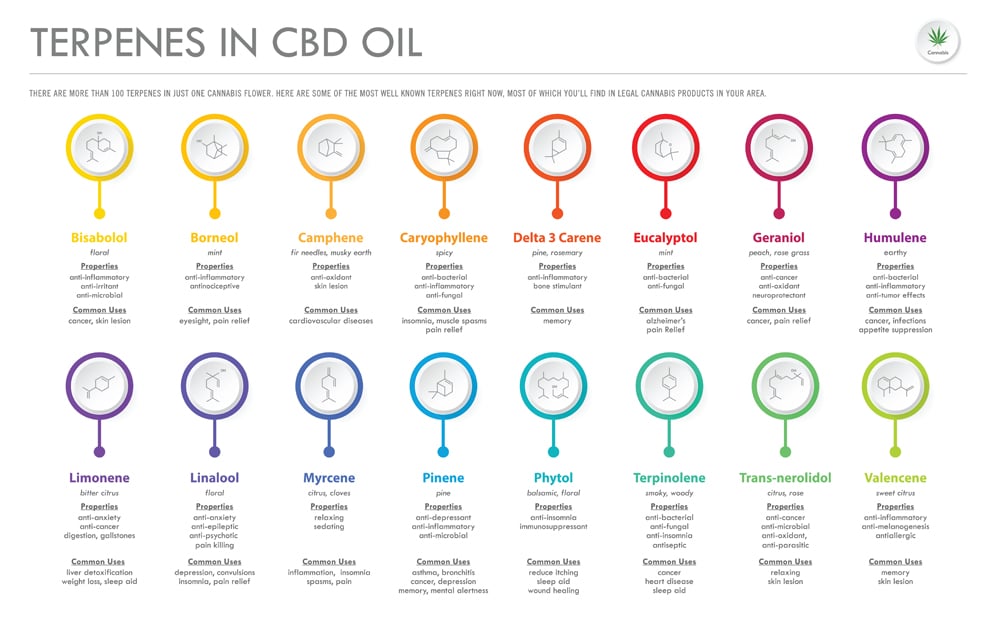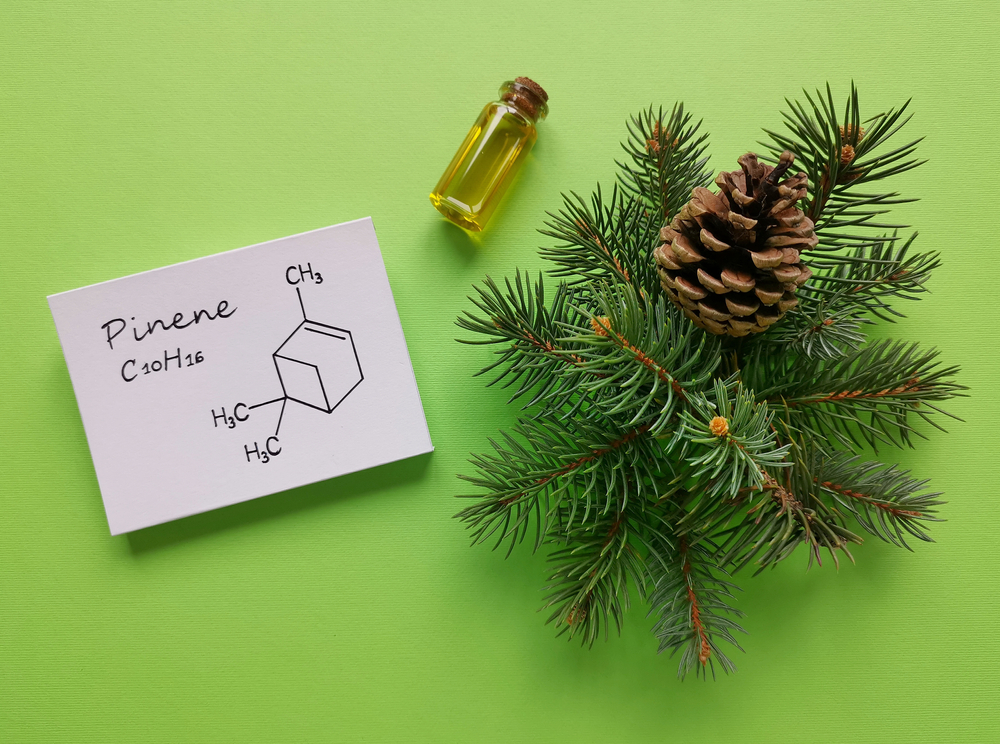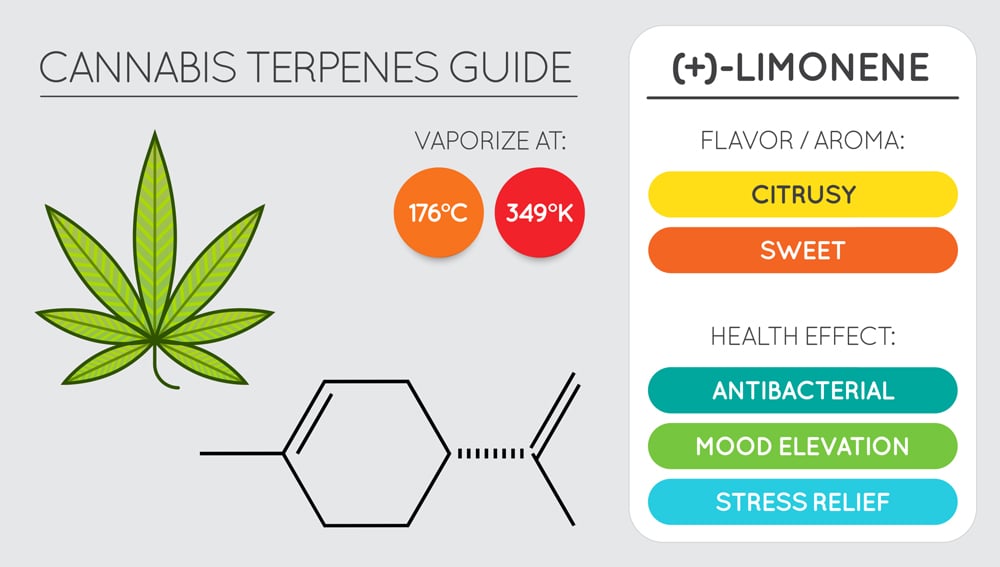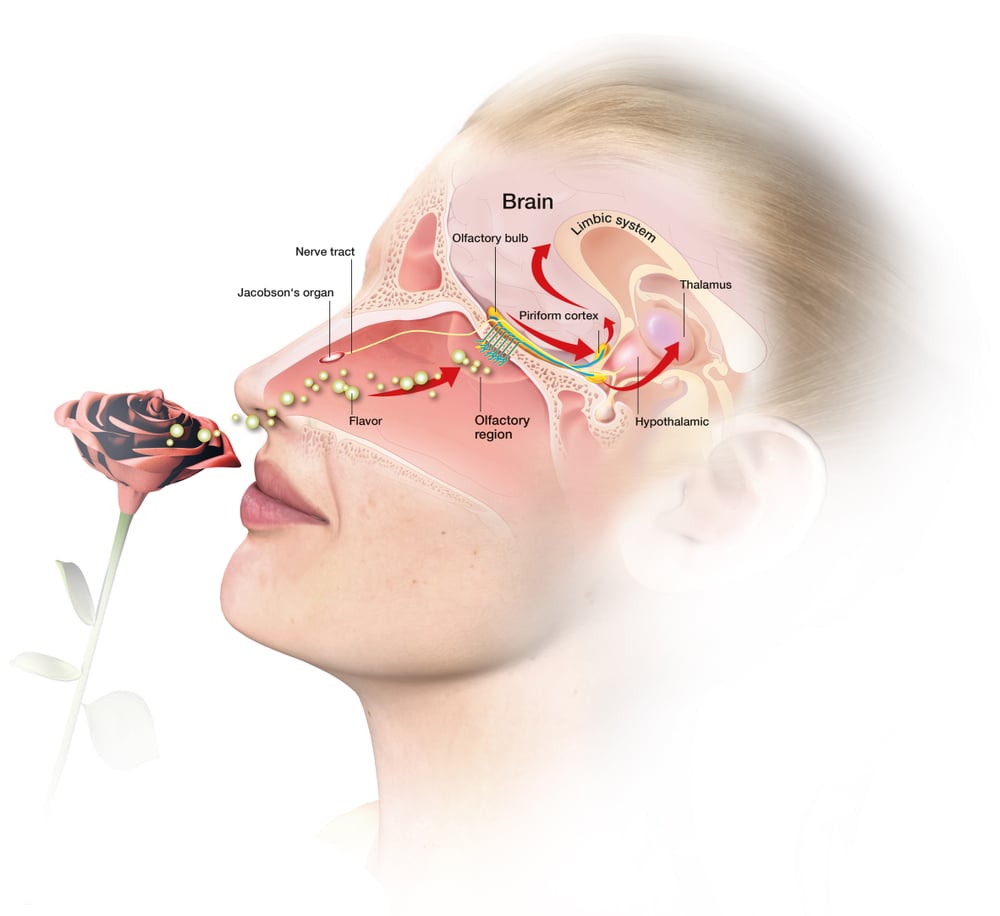Table of Contents (click to expand)
The smell of pine is refreshing due certain volatile chemicals, called terpenes, that are produced by the pine tree. Some of these critical terpenes are pinene and limonene. These smells are refreshing, and have several health benefits associated with them.
Remember that refreshing feeling of going out to pick out a Christmas tree? Is that just the ‘spirit of Christmas’ or something more… scientific?
There’s no denying that a fresh pine scent wafting through the house is one of the best parts of Christmas, but did you know that what you’re smelling is the exact compound present in cannabidiol (CBD) products! You are smelling terpenes lingering in the air.

Recommended Video for you:
What Are Terpenes?
Terpenes are a group of naturally occurring organic compounds that are abundantly found in fruits, vegetables and flowers. They give plants their fragrance, taste and pigment. Unknowingly, we have tasted terpenes millions of times, whether it’s in a bite of mango or a fresh Caprese salad filled with tomato, basil and mozzarella.
Above all, terpenes are sought after for their medicinal applications. In 2013, researchers discovered that a certain class of terpenes called sesquiterpenes can be used to treat malaria, bacterial infections and migraines. Further studies have uncovered its application in wound healing and cardiovascular diseases.

Therefore, it may not be a surprise that over 120 types of terpenes are used in cannabidiol (CBD), an essential component of medical marijuana. CBD is extracted from the hemp plant (a cousin of the cannabis plant) and by itself does not cause a ‘high’.
A report by the World Health Organization (WHO) states that there has been no sign of public health-related problems linked with the use of pure CBD and it exhibits no effects characteristic of any abuse or dependence potential. Hence, CBD has become an important medication for treating epilepsy, seizures, anxiety and different types of chronic pain.
Yet none of this really explains why a walk in a pine forest feels refreshing, right? Let’s dig deeper.
Which Terpenes Are Responsible For The Refreshing Pine Smell?
You know how you can smell a flower even before you get close to it? That’s because terpenes are evaporative, which means that due to their tiny structure, they can easily dissociate from the plant and into the surrounding environment. Similarly, you can smell pine trees in a forest or at home during Christmas.
Pinene
The exact terpene that gives this conifer the signature pine scent is called pinene. There are two types of pinene, alpha-pinene and beta-pinene. Alpha-pinene has shown proven anti-inflammatory activity by inhibiting bronchitis, chronic obstructive pulmonary disease, ear edema, skin inflammation, and osteoarthritis. It is a bronchodilator used in the treatment of asthma and is one of the many terpenes present in cannabidiol. In fact, its presence is one of the reasons why cannabidiol is used to reduce airway inflammation in allergic asthma.

Limonene
Some types of pine trees (e.g Eucalyptus) also contain an additional terpene called limonene. It is a major constituent of both pine tree essential oils and cannabidiol, which comes as no surprise, considering that limonene gives off a citrusy scent. It’s no secret that citrus is nature’s very own packet of zen.
Research has shown that citrus scents have a positive effect on physical, mental, and spiritual wellbeing. However, the real ‘MVP’ here is limonene. Apart from reducing stress and anxiety, limonene also has anti-inflammatory properties, which have been confirmed in a study where it reduced allergic lung inflammation in mice.

Hence, smelling the airborne terpenes while walking through a pine forest has the same effect as inhaling CBD oil. The terpenes present in the air are inhaled, which expands the airways, leaving you feeling refreshed.
Interestingly, the therapeutic prowess of these terpenes is not limited to just battling inflammation. An in-depth study revealed that both alpha-pinene and beta-pinene possess a wide range of pharmacological activities. Both pinene varieties show antimicrobial, antibiotic and antimalarial properties. They have also gained popularity as anticonvulsants used to make anti-epileptic medications. In traditional Chinese Medicine, pine needle oil containing α-pinene is used as an anti-cancer agent.
Limonene is also a popular anti-cancer agent, with a 2017 study showing that limonene from pine cones can kill lung cancer cells. Oil containing limonene was found to be effective against three major human viruses—herpes simplex virus-1, dengue virus type 2, and Junin virus.
How Can Smelling Fragrances Improve Brain Health?
A study published in 2008 showed that smell can also influence our interpretation of emotions. Some participants were exposed to the smells of different plants while others were not. The group that was smelling the plants rated themselves as being higher in mood, alertness, and calmness compared to a control group. These results were not reproduced when artificial scents were used. This implied that natural scents can improve overall emotional functioning.
This is largely attributed to the fact that our olfactory system and emotional systems, such as the limbic system, interact in the brain.

All of the above pieces of evidence support the benefits of forest bathing. Forest bathing was viewed largely as a fitness trend, but for some, it is a form of ‘ecotherapy’. Originating in Japan, where it is called shinrin–yoku, it is based on the theory, which might as well be a fact at this point, that time spent in nature is good for our mind and body.

A simple walk in a forest unlocks all five senses. Nature enters through your ears, eyes, nose, mouth, hands and feet. It is a welcome respite from the city smog and dings of mobile phone notifications. Research has shown that shinrin-yoku lowers cortisol concentration, pulse rate and blood pressure, all of which are characteristics of low stress levels. It also slows down nerve activity, which is usually heightened in a city environment.
So, now we can confirm what a tiny part of ourselves already knew; a simple walk is a perfect antidote for all of the stress we accumulate throughout our days!
References (click to expand)
- Cannabidiol (CBD): What we know and what we don't. Harvard University
- Salehi, B., Upadhyay, S., Erdogan Orhan, I., Kumar Jugran, A., L.D. Jayaweera, S., A. Dias, D., … Sharifi-Rad, J. (2019, November 14). Therapeutic Potential of α- and β-Pinene: A Miracle Gift of Nature. Biomolecules. MDPI AG.
- Cho, K. S., Lim, Y.-. ran ., Lee, K., Lee, J., Lee, J. H., & Lee, I.-S. (2017, April 15). Terpenes from Forests and Human Health. Toxicological Research. The Korean Society of Toxicology.
- Cox-Georgian, D., Ramadoss, N., Dona, C., & Basu, C. (2019). Therapeutic and Medicinal Uses of Terpenes. Medicinal Plants. Springer International Publishing.
- Park, B. J., Tsunetsugu, Y., Kasetani, T., Kagawa, T., & Miyazaki, Y. (2009, May 2). The physiological effects of Shinrin-yoku (taking in the forest atmosphere or forest bathing): evidence from field experiments in 24 forests across Japan. Environmental Health and Preventive Medicine. Springer Science and Business Media LLC.












